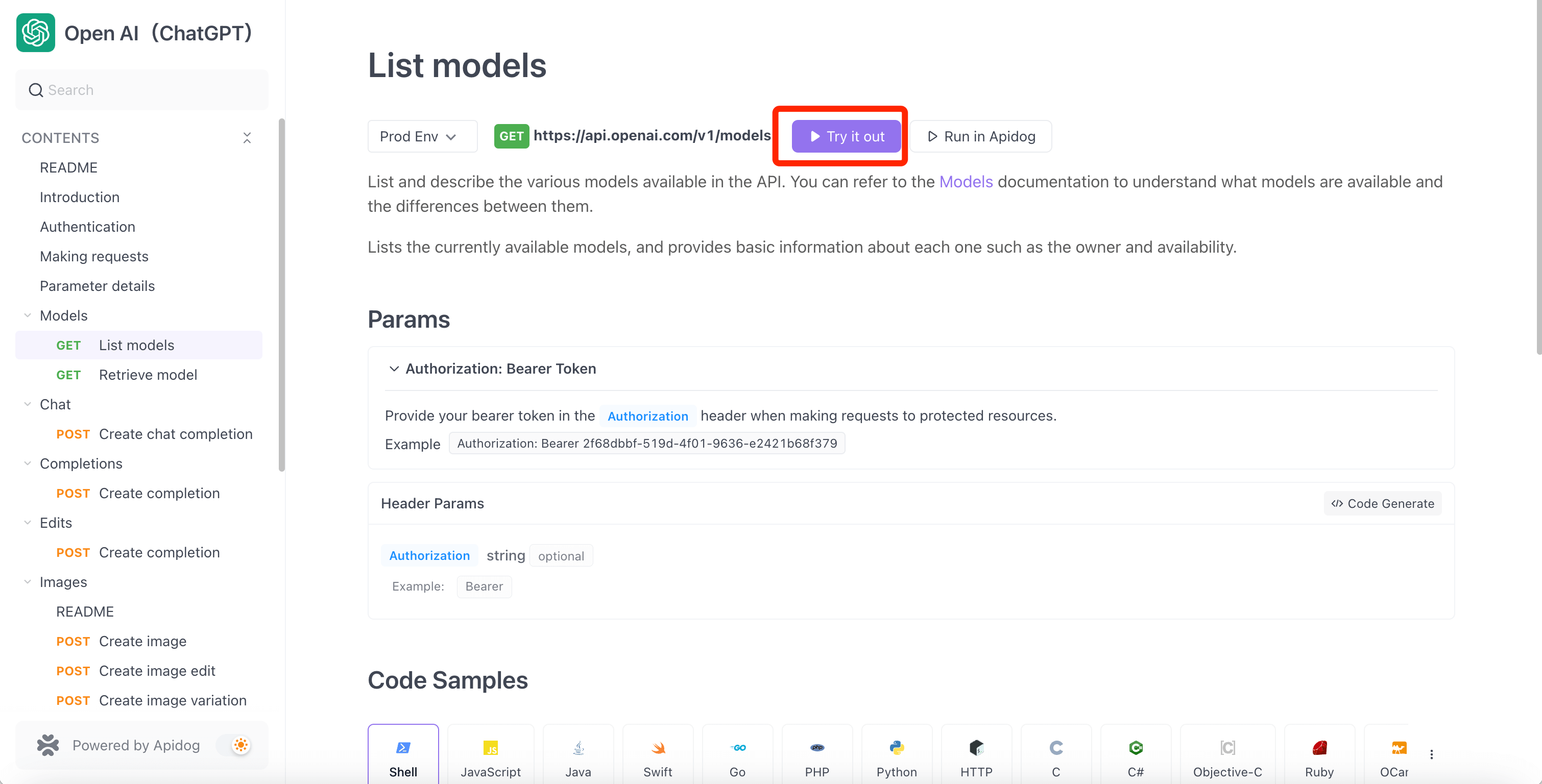In the ever-evolving landscape of artificial intelligence (AI), OpenAI stands as a leader, offering groundbreaking tools to developers and researchers. The key to unlocking this potential lies in the OpenAI API key.
If Apidog seems interesting, learn all that Apidog has to offer by clicking the button below.

This article serves as a comprehensive guide, exploring the functionality of these keys, the exciting applications they enable, and the steps to acquire your own, empowering you to harness the full potential of AI for your projects.
What is OpenAI?
OpenAI is a non-profit research company established in 2015 with the primary objective of conducting research and promoting friendly artificial intelligence (AI). They work towards ensuring that AI development is beneficial to humanity and carried out in a responsible manner. Their efforts encompass:
Research and Development of Safe and Advanced AI
OpenAI dedicates significant resources to exploring the potential of AI technologies while mitigating potential risks. This includes developing new algorithms, training powerful AI models, and investigating safety protocols to prevent unintended consequences.
Collaboration and Knowledge Sharing
OpenAI fosters collaboration within the AI research community by publishing research findings, organizing workshops, and advocating for open dialogue regarding the development and deployment of AI.
Advocacy for Responsible AI Development
OpenAI actively engages in discussions about the ethical implications of AI and promotes responsible practices throughout the field. This includes considerations around bias, transparency, and potential societal impacts of advanced AI.
By combining research efforts with open collaboration and responsible development principles, OpenAI strives to ensure that AI becomes a powerful tool for good, benefiting society as a whole.
What Can OpenAI be Used For?
OpenAI works on multiple fronts to achieve its goals of safe and beneficial artificial intelligence. Here's a breakdown of their key approaches:
Research and Development
Machine Learning Techniques: OpenAI is a leader in developing and applying machine learning techniques, particularly focusing on deep learning approaches like neural networks. These algorithms are trained on massive datasets of text, code, and other digital information, allowing them to learn complex patterns and relationships.
Large Language Models (LLMs): OpenAI is well-known for its Generative Pre-trained Transformer (GPT) models, like GPT-3 and GPT-4. These are large LLMs trained on massive amounts of text data, enabling them to perform impressive feats in natural language processing (NLP) tasks like generating text, translation, writing different kinds of creative content, and answering questions in an informative way.
Reinforcement Learning: This approach involves training AI models through trial and error, where the model learns by interacting with a simulated environment and receiving rewards for desired behaviors. OpenAI has utilized this technique for projects like training AI agents to play complex video games.
Collaboration and Open Access
Research Publications: OpenAI shares its research findings through publications and code releases, fostering collaboration and knowledge sharing within the AI research community.
OpenAI API: They offer an Application Programming Interface (API) that allows developers and researchers to access and utilize their pre-trained models and tools in their projects. This API access comes with an OpenAI API key, which controls access and usage.
Workshops and Events: OpenAI organizes workshops and conferences to facilitate discussions and collaboration among researchers and developers working on AI safety and development.
Safety and Responsible AI Development
Alignment Research: OpenAI actively researches methods to ensure AI systems remain aligned with human values and goals. This involves developing techniques to prevent unintended consequences and ensure AI models operate as intended.
Transparency and Explainability: They strive to make AI models more transparent and explainable, allowing humans to understand the reasoning behind the model's outputs and decisions.
Ethical Considerations: OpenAI engages in discussions about the ethical implications of AI, addressing concerns around bias, fairness, and potential societal impacts of advanced intelligence.
In essence, OpenAI operates by combining cutting-edge research and development in machine learning with open collaboration and a strong focus on ensuring the safe and responsible development of AI for the benefit of society.
OpenAI API Key - Required Component for API Consumption
The OpenAI API key serves as a unique identifier for your account, authenticating your requests when interacting with the OpenAI API.
The OpenAI API key allows you to perform a myriad of possibilities:
Access to Advanced AI Models
With the OpenAI API key, you can interact with OpenAI's pre-trained models, like GPT-3 or GPT-4. These models excel in various natural language processing tasks, including text generation, translation, creative writing, and question-answering.
Integration into Projects
Developers can utilize the API to integrate OpenAI's capabilities into their applications, software, or online services. This allows them to leverage AI for tasks like chatbot development, content creation, or data analysis.
Experimentation and Innovation
The API key empowers researchers and developers to experiment with OpenAI's models and explore new applications for AI technology.
How to Obtain the OpenAI API Key
To use OpenAI's APIs such as the GPT-4o API and Sora API, you will need to be able to access the OpenAI API key.


1. Sign up for an OpenAI account
Obtaining an OpenAI account is the initial step towards utilizing the GPT-4o API. Navigate to the official OpenAI website and locate the "Get Started" button positioned in the top right corner to initiate the account creation process.

2. Obtain the OpenAI API key
Following successful account creation, secure an API key for authentication purposes. This key is mandatory for GPT-4o API access. Here's how to obtain your key:
Step 1: Locate the "API Keys" page on the OpenAI website and log in with your existing credentials. If you haven't created an account yet, do so at this stage.
Step 2: Once logged in, click the button labeled "Create new secret key" to generate a unique API key for your use.

The generated API key will be presented on the screen momentarily. It's crucial to note that you won't be able to retrieve it later. Therefore, you will have to secure the OpenAI API key upon generation.
Conveniently Test Your OpenAI API Key Using APidog
Apidog is a super convenient tool for using OpenAI's APIs. You test out whether your OpenAI API key works, you can access the following page:

As of writing, the GPT-4o API is only available in the Chat Completions API, Assistants API, and Batch API, so select each one from the left menu of the OpenAI API project to start using the GPT-4o API.

Additionally, Apidog supports Server-Sent Events (SSE), making it easy to stream the GPT-4o API! Check out the details here:


Detailed Guide: Using the GPT-4o API with Apidog
The OpenAI platform offers various tools and resources to facilitate interaction with their APIs. Let's explore how to leverage the Chat Completions API to utilize the GPT-4o model.
To interact with GPT-4o via the OpenAI API, follow these steps:
1. Locate the Chat Completions API documentation within the OpenAI platform.
2. Identify the appropriate HTTP method and endpoint URL based on the API specifications.
3. Within the designated section (often labeled "Body"), construct a JSON object containing the message you intend to send to the GPT-4o model.
Note: To use GPT-4o, specify the model as "gpt-4o" by including "model":"gpt-4o".

Next, navigate to the "Header" tab and locate the "Authorization" parameter. This field serves for authentication purposes. Enter your previously obtained OpenAI API key within this parameter. Once complete, initiate the request by clicking the "Send" button.

Consider utilizing environment variables to store your OpenAI API key securely. This approach allows you to reference the key indirectly within your code, eliminating the need to enter it and enhancing security repeatedly.
Conclusion
The OpenAI API key acts as your gateway to a world of groundbreaking AI capabilities. By leveraging this key, you can unlock the potential of OpenAI's advanced models like GPT-4o, empowering you to tackle complex tasks and explore innovative applications in natural language processing.
From generating creative text formats to streamlining data analysis and crafting intelligent chatbots, the possibilities are vast. With responsible use and a focus on ethical considerations, the OpenAI API key serves as a powerful tool for developers and researchers to push the boundaries of AI and shape a future fueled by its potential.pen_spark




